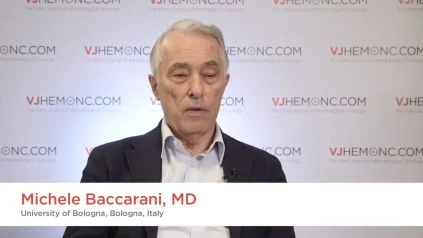Michele Baccarani, MD from University of Bologna, Bologna, Italy, discusses the symposium on Current and emerging treatment goals in chronic myeloid leukemia (CML) held at the European Hematology Association (EHA) 2016 Annual Congress in Copenhagen, Denmark. In particular, Prof. Baccarani discusses the new issue of treatment-free remission (TFR). Survival of patients with tyrosine kinase inhibitors (TKIs) is excellent, which makes it difficult to design studies to improve the outcome of treatment of CML according to Prof. Baccarani. Due to the success of the treatment, many patients die of other causes and therefore, the number of patients who stay alive without treatment for CML becomes important, i.e. TFR. Prof. Baccarani mentions the beneficial consequences of reaching TFR, namely patients being free of drug side effects and their psychological well-being improving significantly; TFR also means that the burden on society in terms of drug costs is lessened. The goal for upcoming CML studies will be the percentage of patients who can achieve TFR. Specific focus of the symposium was placed on the question of finding the best treatment for CML so that more patients achieve TFR. The second generation tyrosine kinase inhibitors (TKI), nilotinib and also dasatinib, were discussed in this context and according to Prof. Baccarani, it was expected that with second generation TKI, more patients can achieve TFR; however, this is not yet known. Prof. Baccarani also discusses a new fourth generation TKI called ABL001, which is not yet available. Preliminary results of ABL001 when combined with nilotinib, show that this combination can bring more patients into TFR and also more rapidly.
[the_ad id="32629"]

